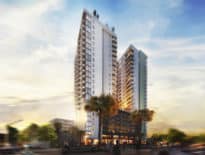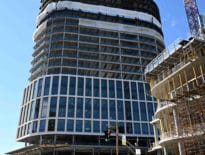Bill Madsen Hardy
Owner, New Atlantic Development
Age: 52
Industry experience: 27 years
Bill Madsen Hardy is on the short list of real estate developers to send a distress signal when Boston artists face imminent displacement. His South End firm specializes in developing affordable and mixed-income housing, including artist live-work studios. In its most recent acquisition, New Atlantic bought Dorchester’s Humphreys Street Studios for $3 million and plans to propose affordable condominiums on a vacant adjacent parcel, to help subsidize the project and preserve workspaces for 50 tenants.
Q: How did you arrive at New Atlantic Development’s specialty in these tricky real estate transactions?
A: I got my master’s in urban planning in 1995 and immediately went to work for a small development and consulting company in Detroit. We did a variety of planning work, but also a little development. I quickly gravitated to the development side. I was more attracted to actually doing things and I found I had a knack for the finance side of things.
Q: What were the housing development opportunities like in Detroit during the 1990s?
A: It was not a good time economically. Detroit was very difficult. In the three years I was there, I completed one nine-unit project. I moved to Boston in 1998. My wife had grown up here, and she was pregnant and we thought Boston was probably a nicer place to raise a kid than downtown Detroit at the time, although I still love Detroit and consider it my home. I started working at a nonprofit, Homeowners’ Rehab Inc. in Cambridge, and in my first three years working there I think I completed 450 units. So, it was the exact opposite: from a place where nothing could get done to a place where everybody in the affordable housing industry is uber-capable.
The smallest nonprofit has a director who has multiple master’s degrees from Harvard, so it’s a very different environment. I gained experience in the low-income tax program, and left Homeowners’ Rehab in 2000 and started working with New Atlantic Development. The founder, Peter Roth, was working on his own and was trying to ramp up to larger multifamily projects. He had a couple of properties and I was interested in a new job because in Cambridge, we spent all the affordable housing trust funds for the next three years and there wasn’t much going on in the pipeline. I started working with Peter, who was a professor in the master’s of real estate program at MIT, and needed someone experienced in tax credits and affordable housing.
Q: What was the catalyst for New Atlantic’s first project involving artist studios or housing?
A: We got a call from the Boston Department of Neighborhood Development, and they asked us to get involved with a group of tenants who had been issued eviction notices by a developer who bought their [Brookside Artist Studios] in Jamaica Plain and intended to raze it and build market-rate housing. The building was a collection of live-work spaces and commercial spaces, so because there was housing involved, the tenants went to housing court and got a stay for the evictions. We got involved and helped them negotiate a purchase offer with the owner, so he got his money back. We rehabbed the building and created 24 condominiums and sold them to artists.
Then other opportunities came up. In 2010, a prolific developer who worked all over Massachusetts, Bob Kuehn, passed away and he had no heirs, and all his properties went into a trust for his estate to be managed by a couple of lawyers. They were trying to liquidate his assets and there were two artist properties that were being put on the market. And again, the city called us and said, ‘Hey, can you do your magic and help these tenants?’ We did the same thing with those two properties: the Midway Studios in Fort Point and the Walter Baker Lofts in Dorchester.
Q: How were you able to push the Humphreys Street Studios acquisition over the finish line this fall?
A: Humphreys Street was a real roller-coaster. I think I started looking at that project three-and-a-half years ago. One of the reasons we didn’t move forward at that time was concerns over the environmental condition of the property. To the sellers’ credit, they took that information and worked with their environmental consultant and did enough work that was required so they could close out the property with the Department of Environmental Protection and reach a permanent site solution. Once that was done, our interest was renewed. Once we had our environmental consultant review everything, lenders were all comfortable. Then a lawsuit was filed by an abutter disputing ownership of a sliver of land. We went ahead and made the decision to buy the property with that litigation outstanding. We decided the worst-case scenario is we don’t get to use that sliver of land, but we’re still OK. We’re exploring all of our options [for housing] for that back lot. We’ll have a public and community process about what kind of density the neighborhood would be open to. That’s question number one. Everything is possible, from rentals to home ownership.
Hardy’s Five Favorite Tequilas:
- El Tesoro Reposado
- Gran Centenario Reposado
- Fortaleza Blanco
- Código 1530 Rosa
- Tapatio Blanco







